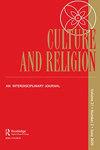Gender, sect and shrine: discursive contestations at Bibi Pak Daman, Lahore
IF 0.5
0 RELIGION
引用次数: 0
Abstract
ABSTRACT The syncretic traditions and practices at a shrine can defy the prevalence of rationalistic bureaucratisation and authorised tradition along a number of vectors. One can find such activities at one of the most thriving shrines of Lahore, Pakistan, that of Bibi Pak Daman. Not only is this site unusual because of the veneration of women spiritual figures, additionally the contesting claims and practices found at this site map onto sectarian (Sunni-Shia) boundaries and challenge the very origin, found in modern historiographical narratives, of the shrine. Cleavages around gender and sect increase with the administrative taking over of the shrine by the postcolonial state of Pakistan, which is ideologically determined to wipe out pluralistic practices in the name of modernisation. Interestingly, this study shows that, contrary to disenchantment arising from bureaucratic modernisation, rationalising claims perversely add a few more localised practices giving depth to the shrines sacred geography and make no difference to devotee numbers.性别,教派和神社:拉合尔比比帕克达曼的话语争论
神社的融合传统和实践可以沿着一些向量对抗理性主义官僚化和授权传统的盛行。人们可以在巴基斯坦拉合尔最繁荣的圣地之一比比帕克达曼找到这样的活动。这个地方不寻常,不仅因为对女性精神人物的崇拜,而且在这个地方发现的有争议的主张和做法映射了宗派(逊尼派-什叶派)的界限,并挑战了现代史学叙述中发现的神社的起源。后殖民时期的巴基斯坦政府在意识形态上决心以现代化的名义抹去多元化的做法,随着对圣地的行政接管,围绕性别和教派的分歧也在加剧。有趣的是,这项研究表明,与官僚主义现代化带来的觉醒相反,合理化的主张反常地增加了一些更本地化的做法,赋予了神社的神圣地理深度,对信徒人数没有影响。
本文章由计算机程序翻译,如有差异,请以英文原文为准。
求助全文
约1分钟内获得全文
求助全文

 求助内容:
求助内容: 应助结果提醒方式:
应助结果提醒方式:


